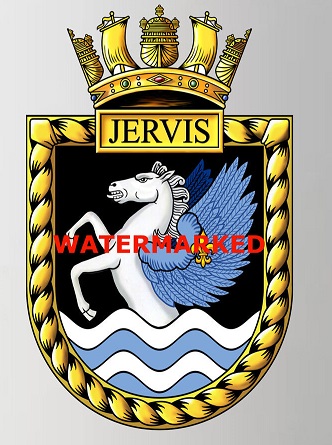HMS Jervis, Royal Navy: Difference between revisions
Jump to navigation
Jump to search
(Created page with "''' {{uc:{{PAGENAME}}}} ''' [[File:{{PAGENAME}}.jpg|center|350 px|Coat of arms (crest) of the {{PAGENAME}}]] {| class="wikitable" |+Official blazon |- |'''English''' |Black; issuant from water in base barry of four white and blue a demi-pegasus white winged blue on the wing a fleur-de-lys gold. |} ===Origin/meaning=== From the Arms of Admiral of the Fleet Sir John Jervis (1755-1823), Earl St Vincent and First Lord of the Admirality. He instituted the cermony of Col...") |
Knorrepoes (talk | contribs) m (Text replacement - "The Badge" to "The badge") |
||
| Line 11: | Line 11: | ||
===Origin/meaning=== | ===Origin/meaning=== | ||
From the Arms of Admiral of the Fleet Sir John Jervis (1755-1823), Earl St Vincent and First Lord of the Admirality. He instituted the cermony of Colours in the Royal Navy. The | From the Arms of Admiral of the Fleet Sir John Jervis (1755-1823), Earl St Vincent and First Lord of the Admirality. He instituted the cermony of Colours in the Royal Navy. The badge was approved on 13 March 1938. | ||
Revision as of 13:08, 15 October 2023
HMS JERVIS, ROYAL NAVY
| English | Black; issuant from water in base barry of four white and blue a demi-pegasus white winged blue on the wing a fleur-de-lys gold. |
Origin/meaning
From the Arms of Admiral of the Fleet Sir John Jervis (1755-1823), Earl St Vincent and First Lord of the Admirality. He instituted the cermony of Colours in the Royal Navy. The badge was approved on 13 March 1938.
Literature: Image from ebay.com. Information from Admirality Badges Encyclopaedia by T.P. Stopford.
